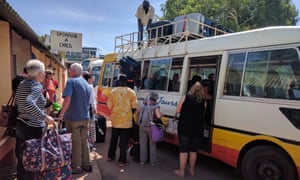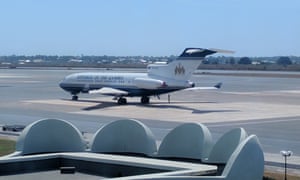There were chaotic scenes at Banjul airport in the Gambia on Wednesday as tourists scrambled to leave the country after its embattled president announced a national state of emergency.
British tourists who were hoping to soak up some winter sun were repacking their bags and boarding buses from resorts across the small west African nation as tour operators decided to evacuate their customers in response to a change in Foreign Office advice.
The country’s long-time president, Yahya Jammeh, announced a national state of emergency on Tuesday, prompting the Foreign Office to change its travel advice, warning against all but essential travel because of the political crisis.
Jammeh is due to hand over to the president-elect, Adama Barrow, at midnight on Wednesday but has so far refused to cede power, using the courts and parliament to try to extend his 22-year tenure.
Barrow has vowed to take office on Thursday regardless of whether Jammeh leaves. “Our future starts tomorrow,” he was quoted as saying in a tweet, adding that his supporters made history when they elected him in December.
Barrow is currently in neighbouring Senegal for his safety, and it was not clear how or where the inauguration would take place.
“This never happened before,” said Robert Gwynne, a tourist from Swindon who has been coming to the Gambia for 11 years and who had to leave two days into his two-week holiday. “I don’t understand what’s going on. The government shouldn’t have let it go this far. This place is going to be dead. I feel sorry for everybody here. It’s going to take years for tourism to pick up again. I’ll make the effort, but only if I’m 110% sure it’s safe.”
Local hotel staff were worried that their livelihoods were at risk.

“I’m very sad. We don’t want our guests to go,” said a porter at one of the hotels. “And us Gambians have to stay. It’s our country and there’s nowhere to go. It’s dangerous. But in three days it will be over.”
Banjul airport was in chaos, full of tourists trying to manoeuvre their luggage to the few check-in desks, many not knowing whether they would get on a flight out. Few were appraised of the political situation.
“We had a rough idea, but the guy who was supposed to have left hasn’t left, has he?” said Phil Denton, from Southampton, who was sunbathing shirtless outside the airport. “I’m more worried about the airport, to be honest. It’s the ideal situation for a terrorist attack.”
Charlotte Burril tried to navigate her bags through one of the snaking queues of bronzed and concerned-looking tourists, having learned just a few hours earlier that she would have to get on a plane out. She had not anticipated that being on holiday at the same time as the planned handover of power would be a problem. “We didn’t think it was much of a risk, really. The sad thing is the impact on the staff. As long as nothing actually happens, as long as it blows over, I’d come back,” she said.
Nevertheless, the impact of the unrest on Gambian tourism will be long lasting, according to Sheikh Tejan Nyang, the vice-chair of a tourism association in the Gambia.
“It’s too late. If he [Jammeh] doesn’t leave by today we’ll have to get these guys to get him out. I am sure that won’t take long, but the damage has already been done. There is panic. People are moving away for the country,” he said.

“With all the tour operators withdrawing clients, it’s going to be a big blow. Most of the hotels will close, people will lose their jobs and be living in hardship,” he said.
Tourism accounts for 18-20% of the country’s revenue. Nyang said he thought it would drop to less than half that and would have to be rebuilt just as it was after the coup in which Jammeh took power in 1994.
Jammeh was personally to blame, he said. “He is the biggest culprit. He is the worst enemy of this country, and he has disappointed the country. People have changed their minds. They have had 22 years of dictatorship and they say enough.”
Outside the terminal, Jammeh’s plane sat in the middle of the tarmac, as it has done for the past two weeks, according to airport officials. The president, who could face prosecution for the arrests and disappearances that happened during his tenure, has received several offers of asylum from other countries, in particular Morocco, but has so far not taken them up.
